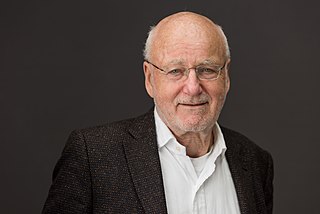Related Research Articles

Basophils are a type of white blood cell. Basophils are the least common type of granulocyte, representing about 0.5% to 1% of circulating white blood cells. However, they are the largest type of granulocyte and how they work is not fully understood. They are responsible for inflammatory reactions during immune response, as well as in the formation of acute and chronic allergic diseases, including anaphylaxis, asthma, atopic dermatitis and hay fever. They also produce compounds that coordinate immune responses, including histamine and serotonin that induce inflammation, and heparin that prevents blood clotting, although there are less than that found in mast cell granules. Mast cells were once thought to be basophils that migrated from the blood into their resident tissues, but they are now known to be different types of cells.

The Joan & Sanford I. Weill Medical College of Cornell University is Cornell University's biomedical research unit and medical school in New York City.

A promyelocyte is a granulocyte precursor, developing from the myeloblast and developing into the myelocyte. Promyelocytes measure 12–20 microns in diameter. The nucleus of a promyelocyte is approximately the same size as a myeloblast but their cytoplasm is much more abundant. They also have less prominent nucleoli than myeloblasts and their chromatin is more coarse and clumped. The cytoplasm is basophilic and contains primary red/purple granules.

Fc fragment of IgE, high affinity I, receptor for; alpha polypeptide, also known as FCER1A, is a protein which in humans is encoded by the FCER1A gene.

OX-2 membrane glycoprotein, also named CD200 is a human protein encoded by the CD200 gene. CD200 gene is in human located on chromosome 3 in proximity to genes encoding other B7 proteins CD80/CD86. In mice CD200 gene is on chromosome 16.

High affinity immunoglobulin epsilon receptor subunit beta is a protein that in humans is encoded by the MS4A2 gene.

Mast cell leukemia is an extremely aggressive subtype of acute myeloid leukemia that usually occurs de novo but can, rarely, evolve from transformation of chronic myeloid leukemia into the more aggressive acute myeloid leukemia. In a small proportion of cases, acute mast cell leukemia may evolve from a more progressive form of systemic mastocytosis. The diagnosis of acute mast cell leukemia by the WHO criteria includes the requirement for a prevalence of 20% neoplastic mast cells in marrow and 10% in blood. If the mast cells represent less than 10% of blood cells, the tumor is called "aleukemic" mast cell leukemia.
In hematology, myelopoiesis in the broadest sense of the term is the production of bone marrow and of all cells that arise from it, namely, all blood cells. In a narrower sense, myelopoiesis also refers specifically to the regulated formation of myeloid leukocytes (myelocytes), including eosinophilic granulocytes, basophilic granulocytes, neutrophilic granulocytes, and monocytes.

Gerald D. Fischbach is an American neuroscientist. He received his M.D. from the Weill Cornell Medical College of Cornell University in 1965 before beginning his research career at the National Institutes of Health in 1966, where his research focused on the mechanisms of neuromuscular junctions. After his tenure at the National Institutes of Health, Fischbach was a professor at Harvard University Medical School from 1972 to 1981 and from 1990 to 1998 and the Washington University School of Medicine from 1981 to 1990. In 1998, he was named the director of the National Institute of Neurological Disorders and Stroke before becoming the Vice President and Dean of the Health and Biomedical Sciences, the Dean of the Faculty of Medicine, and the Dean of the Faculty of Health Sciences at Columbia University from 2001 to 2006. Gerald Fischbach currently serves as the scientific director overseeing the Simons Foundation Autism Research Initiative. Throughout Fischbach's career, much of his research has focused on the formation and function of the neuromuscular junction, which stemmed from his innovative use of cell culture to study synaptic mechanisms.

White blood cells, also called immune cells or immunocytes, are cells of the immune system that are involved in protecting the body against both infectious disease and foreign invaders. White blood cells include three main subtypes: granulocytes, lymphocytes and monocytes.
Lewis C. Cantley is an American cell biologist and biochemist who has made significant advances to the understanding of cancer metabolism. Among his most notable contributions are the discovery and study of the enzyme PI-3-kinase, now known to be important to understanding cancer and diabetes mellitus. He is currently Meyer Director and Professor of Cancer Biology at the Sandra and Edward Meyer Cancer Center at Weill Cornell Medicine in New York City. He was formerly a professor in the Departments of Systems Biology and Medicine at Harvard Medical School, and the Director of Cancer Research at the Beth Israel Deaconess Medical Center, in Boston, Massachusetts. In 2016, he was elected Chairman of the Board for the Hope Funds for Cancer Research.

George Quentin Daley is the Dean of the Faculty of Medicine, Caroline Shields Walker Professor of Medicine, and Professor of Biological Chemistry and Molecular Pharmacology at Harvard Medical School. He was formerly the Robert A. Stranahan Professor of Pediatrics at Harvard Medical School, Director of the Stem Cell Transplantation Program at Boston Children's Hospital, and an investigator of the Howard Hughes Medical Institute, Associate Director of Children's Stem Cell Program, a member of the Executive Committee of the Harvard Stem Cell Institute. He is a past president of the International Society for Stem Cell Research (2007–2008).

Samuel Waxman is the Zena and Michael A. Wiener Professor of Medicine (Cancer), Distinguished Service Professor of Medicine, Hematology, and Medical Oncology, and the Distinguished Service Professor of Oncological Sciences at the Mount Sinai School of Medicine in New York City, where he has been a member of the faculty for over 30 years.

RBL are cancerous basophil cells that are well suited for the study of allergies.
Carl F. Nathan is the chair of the department of microbiology and immunology at Weill Cornell Medicine and a former dean of the Weill Graduate School of Medical Sciences at Cornell University. Some of his most notable work has been in the characterization of IFNγ, TGF-β, and TNFα in immunology. The Nathan lab studies the immune response to M. tuberculosis.
Peter Valent is an Austrian hematologist and stem cell researcher. Since 1990 he leads a research group at the Medical University of Vienna. From 2002 he coordinates the European Competence Network on Mastocytosis and since 2008 he is Scientific Director of the Ludwig Boltzmann Institute for Hematology and Oncology of the Ludwig Boltzmann Society in Austria.
Kendall A. Smith is an American scientist most well-known for his work on interleukins, the regulatory molecules of the immune system, which has led to many of the new present-day therapies for immunological disorders, transplant rejection, infectious diseases and cancer. Smith is a Professor Emeritus of Medicine at Weill Cornell Medicine.

Bob Löwenberg is a clinical hematologist/investigator. He is Professor of Hematology at Erasmus University Rotterdam.
Katherine Amberson Hajjar is an American pediatrician, cell biologist, and academic administrator. She is the senior associate dean for faculty at Weill Cornell Medicine.
Katharine C. Hsu is an American hematologist, oncologist, and academic administrator who researches human natural killer cells. She has served as the director of the Tri-Institutional MD–PhD Program since 2021. Hsu is a professor of medicine at Weill Cornell Medicine.
References
- 1 2 3 4 5 6 7 8 9 10 11 "Dr. Barbara Hempstead Appointed Dean of the Weill Cornell Graduate School of Medical Sciences". WCM Newsroom. January 10, 2019. Retrieved 2024-01-20.
- ↑ Hempstead, Barbara Louise (1982). The Cell Surface Receptor for Immunoglobulin E: Characterization of the Receptor from Human Basophils, Rat Mast Cells and Rat Basophilic Leukemia Cells (Ph.D. thesis). Washington University School of Medicine. OCLC 8637782.
- ↑ "Barbara L. Hempstead | Weill Cornell Medicine". directory.weill.cornell.edu. Retrieved 2024-01-20.